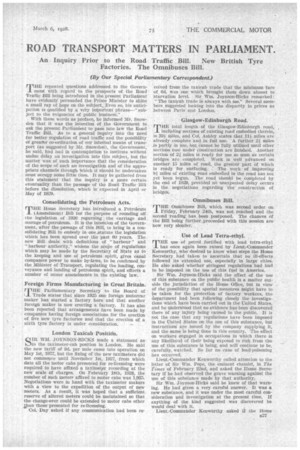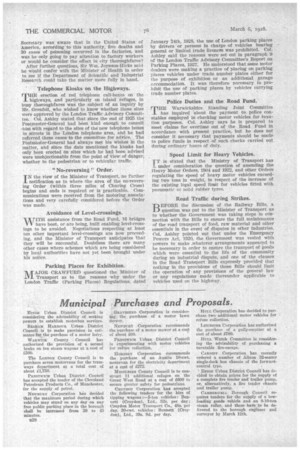ROAD TRANSPORT MATTERS IN PARLIAMENT.
Page 53

Page 54

If you've noticed an error in this article please click here to report it so we can fix it.
An Inquiry Prior to the Road Traffic Bill. New British Tyre Factories, The Omnibuses Bill.
(By Our Special Parliamentary Correspondent.) THE repeated questions addressed to the Govern'meat with -regard to the prospects of the Road Traffic Bill being introduced in the present 'Padiantelit have evidently persuaded the Prime Minister to shine a small ray of hope on the subject._ Even so, his anticipation is qualified by a very important phrase—" subject to the exigencies of public business?' .
With these words as preface, he informed Mr. Snowden that it was the intention of the Government to ask the present Parlianientto pass into law the Road Traffic Bill. As to a general inquiry into the need for better regulation of road traffic and the possibility of greattr co-ordination of our internal means of transport (as suggested by Mr. Snowden), the Government, he said, had had in contemplation to institute without undue delay an investigation into this subject, but the • matter was of such importance that the consideration of the scope of such an investigation and of the appropriate channels through 'Which it should be undertaken must occupy SC1111.0 little time. It may be gathered from this statement that the inquiry is a more certain' eventuality than the passage of the Roail Traffic •Bill before the dissolution, which is expected in April or May of 1929.
Consolidating the -Petroleum Acts.
ruHE Home Secretary has introduced a Petroleum (Amendment)Bill for the purpose of rounding off, the legislation of .1926 regaroing.:•-the. carriage and storage of .petroleum. It is the intention of the Govern-.. inert, after the passageof, this Bill, to .bring in a con. selidating Bill to embodyin •one,statute the. legislation which has been spread over.. the past 60 years. The new • Bill deals with definitions of " harbour " and "harbour authority," widens the .scope of regulatiOns which may be made by the Secretary of State as to the keeping and use of petroleum spirit, gives canal companies power to make by-laws, to be confirmed. by the Minister of Transport, regulating the 'loading, conveyance and landing of petroleum spirit, and effects a number of minor amendments in the existing law.
Foreign Firms Manufacturing in Great Britain.
rpnE Parliamentary-Secretary to the Board of 11 Trade states that since 1925 one foreign motorcar maker has started a factory here and that another foreign maker is now erecting a factory. It has also been reported that arrangements have been made by companies having foreign associations for the erection of five new tyre factories and that the erection of a sixth tyre factory is under consideration. •
London Taxicab Positidn.
SIR 'WM. JOYNSON-HICKS made a statement as to the taximeter-cab position in London. He said the new tariff of 90.. per mile came into operation on May 1st, 1927, but tile fixing of the new taximeters did not commence until November 1st, 1927, from which date all the motor cabs presented for re-licensing were required to have affixed a taximeter recording at the new scale of charges. On February 18th, 1928, the number of such meters affixed to motor cabs was 1,935. Negotiations were hi hand with the taximeter makers with a view to the expedition of the output of new meters. As a result, it was hoped that a sufficient_ reserve of altered meters could be maintained so that the change-over could be extended to motor cabs other
those presented for re-licensing.
Col. Day asked if any communication had been re ceived from the taxicab trade that the minimum fare of 60. was one which brought Mein down almost to Starvation level. Sir Wm. Joynson-Hicks remarked : "The taxicab trade is always with me:" Several members suggested looking into the disparity in prices as _between Paris and London.
Glasgow-Edinburgh Road.
THE total length of the Glasgow-Edinburgh road, inclilding sections of. existing road embodied therein, is 391 miles, and Col. Ashley states that 111 miles, are already complete and in full use. A further 21 Miles is partly in use, hut. Cat-mate fully utiliEed until other sections now under construction are finished. Another section of 21 miles is ready for use so soon as certain bridges are, completed. Work is well advanced on another 15 Miles of road, the greater part Of Which is ready for surfacing. The work of improving 81 miles of existing road embodied in -.the road has not yet been begun. The road should be completed by the end of 1929, provided nã unexpected delay .occurs in the negotiations regarding the .construclion of bridges.
Omnibuses Bill.
rrum Omnibuses' Bill, which was second order on
Friday, February. 24th, was not reached and the second reading has been postponed. The chances of the Bill being further proceeded with this session are now very slender.
. • Use of Lead Tetra-ethyl.
TE use of petrol fortified with lead tetra-ethyl has once again been raised by Lieut.-Commander Kenworthy, who desired to know what steps the Home Secretary had taken to ascertain that no ill-effects followed its extended use, especially in large cities. He also asked whether stringent regulations had had to be imposed on the use of this fuel in America.
Sir Wm. Joynson-Hicks said the effect of the use of this substance on the public health is a matter outside the jurisdiction of the Home Office, but in view of the possibility that special measures might have to be taken for the protection of factory workers, the department had been following closely the investigations which have been carried, out in the United States, and he understood that no evidence has been: discoVered, there of any injury being caused to the public. It is • not the case that any regulations have been imposed in the United States on •the use of this substance, but instructionS are issued by the company supplying it, and the same is being done in this country. The effect on workers engaged in occupations in which there is any likelihood of their being exposed to risk from the use of this substance is being, and will continue to be, carefully, watched. So far no ease of lead-poisoning has occurred.
Lieut.-Commander Kenworthy called attention to the letter of Sir Wm. Pope, the eminent chemist, in The Times of February 22nd, and asked the Home Secretary if he had observed the grave warning against the use of this substance made by that authority.
Sir Wm. Joynson-Hicks said he knew of that warning. He had given a very careful answer. It was a new substance, and it was under the most careful consideration and investigation at the present time, if anything of the kind suggested was discovered he would deal with it.
Lieut.-Commander Kenworthy asked if the Home B27
Secretary was aware that in the United States of America, according to this authority, five deaths and 30 cases of poisoning occurred in the factories, and was he only going to pay attention to factory workers or would he consider the effect in city thoroughfares?
After further questions, Sir Wm. Joynson-Hicks said he would confer with the Minister of Health in order to see if the Department of Scientific and Industrial Research could take the matter more fully in hand.
' Telephone Kiosks on the Highways. rr1HE erection of red telephone call-boxes on the 1 highways, and particularly on island refuges, in busy thoroughfares was the subject of an inquiry by Mr. Grenfell,,who wished to know whether those sites were approved by the London Traffic Advisory Committee. Col. Ashley stated that since the end of 1925 the Postmaster-General had been kind enough to consult 'him with regard to the sites of the new telephone boxes in streets in the London telephone area, and he had referred these cases to the committee for advice. , The Postmaster-General had always met his wishes in the matter, and since the date mentiOned the kiosks had only been erected On sites which he had been advised were unobjectionable from the point of view of danger, whether to the pedestrian or to vehicular traffic.
"No-reversing" Order.
IN the view of the Minister of Transport, no further notification as to where the area of the no-reversing Order (within three miles of Charing Cross) begins and ends is required or is practicable. Communications were received from the motoring .associations and very carefully considered before the Order was made.
Avoidance of Level-crossings.
WITH assistance from the Road Fund, 16 bridges have been, or are being, built enabling level-crossings to be avoided. Negotiations respecting at least ten other important level-crossings are now proceeding, and the Minister of Transport anticipates that they will be successful. Doubtless there are many other cases where schemes which are being considered by local authoritie3 have not yet been brought under his notice.
Parking Places for Exhibition.
MIAJOR CRAWFURD questioned the Minister of ' Transport as to the reasons why under the London Traffic (Parking Places) Regulations, dated January 24th, 1928, the use of London parking places by drivers or persons in charge of vehicles bearing general or limited trade licences was prohibited. Col. Ashley said the reasons were set out in paragraph 9 of the London Traffic Advisory Committee's Report on Parking Places, 1927. He understood that seine motor dealers were making a practice of placing on parking places vehicles under trade number plates either for the purpose of exhibition or as additional garage accommodation. It was therefore necessary to prohibit the use of parking places by vehicles carrying trade number plates.
Police Duties and the Road Fund.
THE Warwickshire Standing Joint Committee has inquired -about the payment to police constables employed in checking motor vehicles for taxation purposes. Col. Ashley says he is prepared to meet claims for overtime out of the Road Fund in accordance with present practice, but he does not consider it necessary that payments should be made to police funds in respect of such checks carried out during ordinary hours of duty.
Speed Limit for Heavy Vehicles.
TT is stated that the Ministry of Transport has
under consideration the question of amending the Heavy Motor Orders, 1904 and 1922, and other Orders regulating the speed of heavy motor vehicles exceeding two tons in weight, in respect of the increase of the existing legal speed limit for vehicles fitted with pneumatic or solid rubber tyres.
Road Traffic during Strikes. Road Traffic during Strikes. BEFORE the discussion of the Railway Bills, a question was put to the Minister of Transport as to whether the Government was taking steps in connection with the Bills to ensure the full maintenance of the road transport of food, raw material and other essentials in the event of disputes in other industries. Col. Ashley pointed out that under the Emergency Powers Act, 1920, the Government was vested with powers to make whatever arrangements appeared to be necessary in order to ensure the transport of goods which were essential to the life of the community during an industrial dispute, and one of the clauses in the Road Transport Bills expressly provided that nothing In the provisions of those Bills should limit the operation of any provisions of the general law or any regulations •made thereunder applicable to vehicles used on the highway.




















































































































